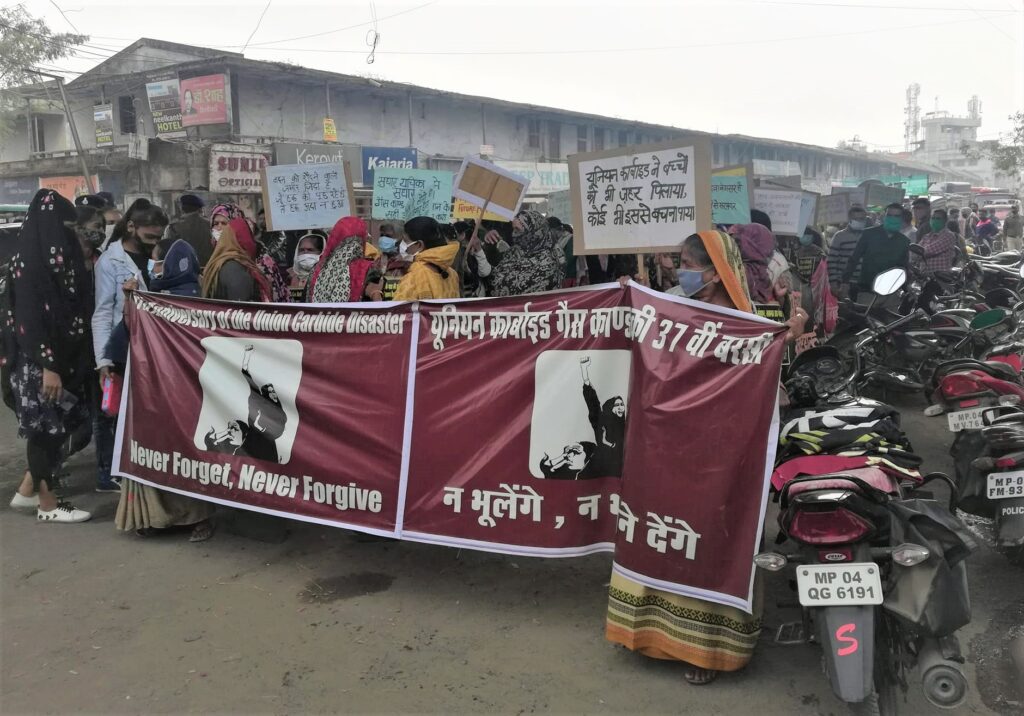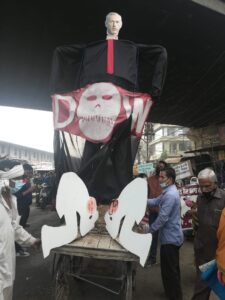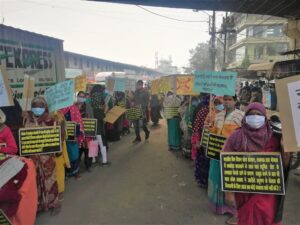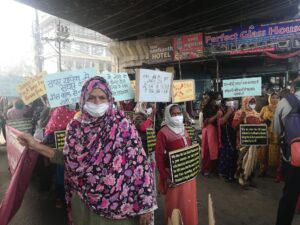Bhopal Gas Leak: An Ongoing Tragedy, 37 Yrs And Counting
Dec 3, 2021 | Shalini Rai
A protest march was taken out in Bhopal today to mark the 37th anniversary of the Bhopal Gas Leak Disaster
Thirty-seven years ago today, on the intervening night of December 2-3, 1984, a potent poison permeated the air and environment in Bhopal, the capital of the central Indian state of Madhya Pradesh. The deadly methyl isocyanate (MIC) gas leaked from the Union Carbide plant then located on the city outskirts and caused the deaths of thousands of people, most of them from the lower middle class and poor background.
Estimates vary on the death toll. The official immediate death toll was 2,259. Activists and survivors say the figure is close to 25,000.
However, the long-term effects of this industrial disaster are visible in groundwater contamination, birth defects in children born decades later and paltry compensation to victims (which is akin to adding insult to injury), making it an ongoing tragedy and a travesty of the basic principles of natural justice.
In 2008, the Government of Madhya Pradesh had paid compensation to the family members of 3,787 victims killed in the gas release, and to 574,366 injured victims. A government affidavit in 2006 stated that the leak caused 558,125 injuries, including 38,478 temporary partial injuries and approximately 3,900 severely and permanently disabling injuries. Others estimate that 8,000 died within two weeks of the gas leak, and another 8,000 or more have since died from gas-related diseases.
Today, near Bharat Talkies in Bhopal, survivors and activists took out a march to mark the 37th anniversary of this industrial disaster, among the worst in the world. Leading from the front were Rashida Bi of the Bhopal Gas Peedit Mahila Stationery Karmchari Sangh, Rachna Dhingra of the Bhopal Group for Information and Action, Satinath Sarangi, Managing Trustee of the Sambhavna Trust and several other prominent activists and stoic survivors.

At the start of the procession — on a hand cart — was a 10-feet-tall effigy covered in black cloth, with the words D-O-W written in bold white letters on a red background, and the letter ‘O’ shaped like a human skull. Following close behind were scores of men and women – a vast majority of them survivors of the dark night of December 2-3, 1984. Some of them looked resigned to their fate, while others still carried the look of defiance in their wizened eyes. Most of them carried placards with slogans denouncing Dow Chemicals, Union Carbide, the Government of India.
One of them read, “Why has the Ministry of Environment, Forests and Climate Change not accepted UNEP’s offer to carry out a scientific assessment of soil and groundwater contamination in and around the Union Carbide factory?”
Another wanted to know: “Why has the prosecution, CBI, not made any attempt so far to extradite the legal representative of Union Carbide and make him appear in the criminal case on the disaster?”
A long rectangular banner with the words “Whose side is the Prime Minister on: American Dow Chemical Company or Bhopal victims?” was seen carried by activists, while another had these words written on it: “One who harbours (a) killer is also a killer.” Some banners stood out from the others — written in both Hindi and English. One of them carried the message: “Bhopal survivors demand punishment to the killer and compensation from the corporation.”
Right at the front of the procession was a vehicle with a large sound system, with activists repeating slogans such as “Ladenge, jeetenge...!” (We will fight and we will win…!)

Speaking exclusively to Pratirodh, Rachna Dhingra said that guilty corporations have been allowed to get away with murder and Bhopal gas tragedy survivors are fighting their own government, apart from battling with the corporation which caused the disaster. “On the 37th anniversary of the Union Carbide disaster in Bhopal, what we see is that the corporations responsible for the disaster are allowed to get away with murder. We see that the people in power are with these corporations in its entirety and after 37 years, people have received less than Rs 25,000 in compensation whereas thousands of tonnes of toxic waste continues to be buried inside and outside the factory, which has contaminated the groundwater for more than 100,000 people. There are massive birth defects in children being born to gas-exposed parents and to those exposed to groundwater contamination and not a single individual or a single corporation has faced a sentence even for a day for killing more than 25,000 people and maiming more than half a million people and the new generation… is reporting all kinds of problems and birth defects… So, what we are seeing after 37 years is that the corporations which are responsible for this disaster are doing business in this country and profiting from the horrible chemicals that they are selling and they have the blessings of our government. So, the Bhopal survivors are not only fighting the corporation, they are also fighting their own government.”
Meanwhile, at a press conference on December 2, 2021, Rashida Bi, President of the Bhopal Gas Peedit Mahila Stationery Karmchari Sangh said, “Dow Chemical’s premium product Chlorpyriphos is banned in USA for causing possible neurological damage, reduced IQ, loss of working memory, and attention deficit disorders and birth defects. However, in India, Corteva, a corporation with close ties to Dow Chemical sells Chlorpyriphos with the trade name Dursban, without mentioning its health hazards or its regulatory ban in USA.”
According to Shahzadi Bi of Bhopal Gas Peedit Mahila Purush Sangharsh Morcha, “In 2014, Dow donated water filtration systems and over 100,000 US dollars in aid to Flint, Michigan, in response to the contamination of the city’s drinking water source. However, in Bhopal, where mercury and cancer-causing chemicals have been found in the breast milk of nursing mothers, Dow quotes scientifically discredited reports of NEERI to claim there is no contamination of groundwater due to hazardous waste from the Union Carbide factory.”
Rachna Dhingra goes on to say that in the United States, Dow submits unquestioningly to government agencies and courts. In 2005, a Dow joint-venture pled guilty and paid 84 million dollars in criminal fine for participating in an international conspiracy to fix the prices of synthetic rubber in violation of the Sherman Act. “In India, Dow has ignored six separate summonses to appear in the court’s proceedings in the disaster, claiming that Indian criminal courts have no jurisdiction over TDCC. Dow Chemical’s double standards are evident in every aspect of their operations,” she says.
“In the US, Dow is paying for the clean-up of 171 contaminated sites, including the Tittabawassee and Saginaw river plains near its headquarters in Midland Michigan. But on the matter of cleaning up the ongoing contamination in Bhopal, Dow says it is the responsibility of the Madhya Pradesh government,” said Nousheen Khan of Children Against Dow/Carbide.

As witnessed at the rousing protest march today, which did not leave even onlookers untouched, the survivors of this terrible industrial tragedy carry on fighting, 37 years since MIC changed their lives forever, for the worse. Some of them — like Abdul Jabbar, who was recently awarded the Padma Shri posthumously — died while still awaiting justice.
If there is a silver lining in all this, it is that the human spirit, especially that of the Bhopal gas disaster survivors, does not know defeat and won’t rest till justice is delivered. In the end, the common refrain of all the survivors is: ‘No more Bhopals.”
